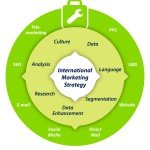Posted by Managementguru in Business Management, Entrepreneurship, How To, International Business, Marketing, Project Management, Sales, Startups
on Mar 11th, 2014 | 0 comments

Export can be in the form of merchandise (goods) or services (invisibles). When an entrepreneur wants to spread out his scope of business activity beyond the territory of his nation it is called export, whence he has to prepare himself to confront the challenges prevailing in the global market. How to go about Export? Business by itself calls for discipline whether you talk about your credit policy, quality of your product or services, on time delivery, payments, fund rotation, human resources management and the like. The taste of success in the domestic market gives you the necessary confidence to spread your wings far and wide. To be a part of the global market, you are expected to imbibe not only more discipline and order but you should be very thorough about the procedures and policies of the country, to which you are planning to export and the various legal formalities pertaining to your business activity. How to Export From India Pic Courtesy: Procedure to Start Export Business from India What will be your plan of action if your merchandise is disapproved of its quality after reaching the destination or the shipment gets destroyed due to some eventuality? To combat contingencies we have to have a representative working for us in the chosen place of activity who would report and handle the proceedings. Pre-Requisites for Exporting Goods: How many people do you think who have acquired the desire to export their products have a clear idea about the steps involved in starting an export business? First you have to secure the IEC CODE (import export code) from the DGFT (Director General of Foreign Trade) that comes under THE MINISTRY OF COMMERCE AND INDUSTRY. What is IEC Code? Import Export Code (also known as IEC) is a 10 digit identification number that is issued by the DGFT (Director General of Foreign Trade), Department of Commerce, Government of India. Info Courtesy: Shiprocket.in It is also known as Importer Exporter Code. It is mandatory for companies and businesses to obtain this code to start a business that deals with import and export in the Indian Territory. It is not possible to deal with export or import business without this code. While exporting you get the following edge over others: Exposure to forex marketExposure to diversified cultureExposure to varied laws and legal formalitiesExposure to business risks which you must take up as a challenge Having businesses in various countries is better than having all businesses in one country. It saves you during periods of economic recession. You experience market growth by entering into different and new markets; Asian and European markets are flooded with traders from all around the world since these regions enjoy a locational advantage in the world map and well connected through the sea and land. RBI Policies: Exporters must be aware of the fact that RBI policies are very severe when it comes to foreign exchange. So you should have proper informational inputs from the correct source and your capital has to be invested accordingly. Slide Courtesy: Import and Export Policies and Procedures Exploring unfamiliar and exotic markets is very difficult as they are always dynamic. You should see to it that you keep yourself posted with updates on INTERNATIONAL FINANCE, LENDING RATES etc. Also Read: 10 key steps to export success You can make a small business big and beautiful by adding some flavor to it like, Right time to launch your product in the global scenario, People’s preference being given priority by doing some demographic survey, Attractive campaigns and of course Your unendurable passion for business will do the rest to make your venture a successful one. Read...

Posted by Managementguru in Business Management, Change management, International Business, Principles of Management
on Mar 7th, 2014 | 0 comments

GLOBALIZATION AND INTERNATIONAL MANAGEMENT Management as a concept has transcended all geographical boundaries and cultures to gain significance. International management has extended itself beyond traditional management practices reflecting different perspectives influenced by cultural diversity and conflicting social forces. The issue of cultural diversity is used to argue that it is divergence that is taking place and not convergence. The emphasis is on the national culture that acts as a key determinant in management behavior. National and regional differences may become one of the most crucial problems for management-in particular for the management of multinational, multicultural organizations, whether public or private. International Managers: Organizations are on the look out for international managers who could transcend themselves nationally to fit into any location for a specific job consideration. Managers are expected to live abroad and run the overseas division or company They are also sent to complete temporary assignments of limited duration, like plant installation and sales missions Companies aim at developing an international manager who can overcome a limited set of national and cultural boundaries, such as euro-manager, middle eats manager. Expatriates: Companies prefer to have their managers as expatriates, owing to the lack of availability of skills in the host country, to prevent dilution of control, to safeguard the overseas investment and to increase performance. But organizations also have to give a second thought about the cost involved in transferring the expatriates, recruitment and issues regarding legal restrictions. International managers have to possess the following skills to compete in the global environment. Technical expertise and experience Sound financial skills People skills, especially cultural empathy, team-building and motivation Intellectual skills, seeing the big picture, thinking macro not micro Emotional maturity, being adaptable,independent,sensitive to national culture,confident,having self awareness to overcome prejudice Having ambition, drive, persistence, stamina and energy. Focus of Global Organizations: Global organizations employ several techniques to develop international managers. They focus on in-house language, culture courses and tailored development programmes for host country managers, imparting education courses with an international base. International firms are also concerned about the power, politics, conflicting priorities, view points existing in the international scenario and they have to confront with coalition of vested interests. To cope, and more importantly to survive, in an organization, there is a growing view that managers have to become politically competent. De-Centralization: Decentralization is the key factor that is going to decide the developing trend of organizations in the years to come. A smaller, but more highly skilled, group of managers will assume an “expanded role” in clearly defined strategic business units. They will be given greater control over resources, technical, financial and human, and be expected to utilize those resources to achieve broad objectives and performance targets. A trend may develop where there is a shift by individuals away from the objective of managing a team of people towards a search for autonomy, creativity, growth and accountability for oneself, if the organizations fail to suitably reward the managers and present them with suitable career...

Posted by Managementguru in Business Management, Economics, International Business, Principles of Management
on Feb 16th, 2014 | 0 comments

The Economic Environment of Business Macro Environment The management of a firm is influenced and affected by many factors that exist in the external environment, also called as macro environment. These are beyond the scope of business control and affect the functioning of a business enterprise. Factors of External Environment that Affect Business These factors may present themselves in the form of opportunities or threats and it is the responsibility of a manager to identify the changes in the external environment, be it, social, economic, political, legal, technological, demographic or ecological and devise action plans accordingly, to suit the changing demands and needs of the macro environment. Buying Power of People The most important and prime factor that affects a firm’s operations and its basic survival is the economic factor. Economy of a country is prosperous only when it is self sufficient and withstands the pressure of inflation or recession. Businesses can flourish only if there is a regular demand for the products manufactured. Economic Factors that Affect Demand The buying power of people and their willingness to pay are also important economic factors that affect demand. In developing countries, people concentrate on “saving” rather than spending, where the economy is showing steady growth. For instance in India, people invest their money in gold and land,both being considered as solid appreciating disposable income,assets. Why do we turn to nonprofits, NGOs and governments to solve society’s biggest problems? Michael Porter admits he’s biased, as a business school professor, but he wants you to hear his case for letting business try to solve massive problems like climate change and access to water. Why? Because when business solves a problem, it makes a profit — which lets that solution grow. Watch the Video… Disposable Income The ability of people to buy, largely depends on their employment, income tax and price of the product. The disposable income of people in developing countries is very meager and it further decreases if the rate of tax increases. Ability to Buy This also affects his or her ability to buy. If his concentration is on “saving”, again his ability to purchase is restricted. Even if the individual has the purchasing power, there is no assurance that he or she will buy, it all depends on their willingness to buy. The purchasing power parity of developing countries is very low when compared to developed countries. Role of Technology In recent times, technology also has played an enormous role in bringing an array of new products into the market, and has improved man’s preference for better products. For a business firm, it is very difficult to predict people’s preference as well as changes in their preferences. It needs a great deal of market research and regular updations. If the prices are in decreasing trend, people will not buy the product immediately; they will wait for some more time to derive maximum benefit or value out of their purchase. So, people’s perception about the market economy, social influences and changing preferences definitely affect the willingness to buy. Competitive Market Managing the competition proves to be a tougher task for each and every individual business firm. In today’s modern high flying business environment, people always expect value added services for the products purchased. Business organisations are in a position to compete for customer’s interest as well as income. Firms think of price reductions, aggressive promotional efforts, attractive offers, differentiated product offerings and customer service as competitive tools to have a sustainable and distinctive advantage over others. Offering new product designs, attractive packing, extended credit facilities, free door delivery and fast and competent repair services also differentiate firms from their competitors. Inflation and...

Posted by Managementguru in Economics, International Business
on Feb 16th, 2014 | 0 comments

Economic Growth Strategies A Purview on Economic Growth Strategies for Developing Countries A developing country is one where the per capita income is low relative to that of fully developed countries. In human terms developing countries typically have major population percentage with poor health, low levels of literacy, inadequate dwellings and meager diets. The key to development rests on four fundamental factors namely human resources, natural resources, capital formation and technology. Human resources: A lot of poor countries are forever running hard just to stay in place. Even as a developing nation’s GDP rises, so does its population. So it becomes a mammoth task for such nations to overcome poverty with birth rates so high. Equitable distribution of wealth cannot happen in an economy unless and until it becomes self sufficient. One strategy will be to curb the population, even if such actions run against prevailing religious norms. Strategies for Developement Economic planners in developing countries lay great emphasis on the following strategies of development with regard to human capital: Control disease and improve health and nutrition Improve education, reduce illiteracy and train workers Above all, do not underestimate the importance of human resources. Literate people are knowledgeable and resourceful; their analytical skills help them to weigh the pros and cons of specific social situations that affect their standards of living. Asian countries like India and China with exploding population figures are in a situation to invest their human capital for productive purposes. Pinning Your Way to Profit With Pinterest Natural Resources: Some developing nations with meager endowments of natural resources such as land and minerals have to divide the available resources among the dense population. Perhaps the most valuable of all the resources would be arable land, as most of the people in developing countries employ themselves in farming, which is the primary economic activity. Hence the productive use of land with appropriate conservation, fertilizers and tillage will go- far in increasing a poor nation’s output. More over land ownership patterns are a key to providing farmers with strong incentives to invest in capital land’s yield. When farmers own land, they are more willing to make improvements, such as irrigation systems and undertake appropriate conservation practices. The governments have to think in these lines if their economy is based on agricultural activity: Farmers should be appraised about modern farming techniques and provided with farming equipments and fertilizers at subsidized rates. Note:-nothing should be given as free as freebies make them lethargic and unmotivated. Much of cultivable lands are being destroyed for commercial purposes which have to be checked. Power generation and supply should be copious and uninterrupted as farming, solely is dependent on availability and usage of ground water. Pumping of water is done through jet pumps and electric motors. Budding population can make a marked difference in the field of farming, as it is impossible for a nation to generate white collar jobs for everyone and it definitely elevates the capacity of youth from being mere employees to that of owners. Organic farming has found a place for itself in international market and human capital of developing nations can be employed in research and development of new strains that will facilitate to capture the global market. Capital formation: Rates of productive capital formation are low in developing countries because of deprived income; little can be saved for the future. The financing of growth in poor countries has always been an unstable link in the productive mechanism. Countries should definitely have a balanced and cautious approach when they plan to finance ambitious development programmes as they will be forced to borrow heavily from other developed countries or the World Bank. Technological change and innovations: This is...








